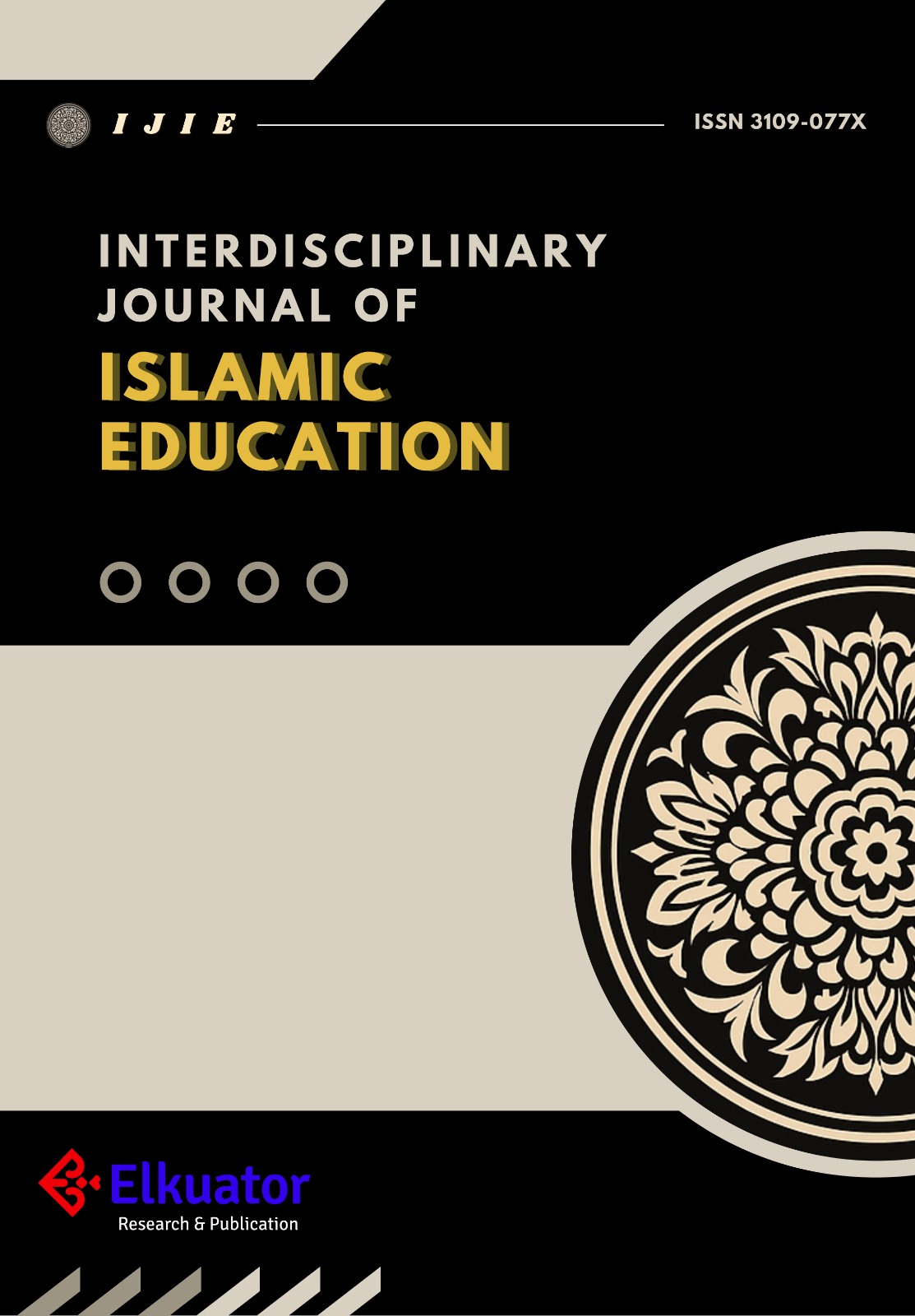Freedom on Whose Terms? A Decolonial Re-Examination of Religion in Indonesia
DOI:
https://doi.org/10.24260/jrd.1.1.43Keywords:
Freedom, Decolonial Re-examination, Religion, IndonesiaAbstract
Restrictions on freedom of religion in Indonesia lead to discrimination against religious groups and generate social pressures reinforcing practices of intolerance. This situation highlights the urgency of rethinking the decolonial process in the legal framework of religious freedom, particularly regarding the recognition of the rights of indigenous belief systems (aliran kepercayaan) and religious minorities. This study employs a qualitative approach grounded in decolonial theory, drawing on data from Setara Institute reports spanning from 2014 to 2024. It addresses three central questions: How can decoloniality be interpreted within the context of religion in Indonesia; How does religious freedom challenge contemporary manifestations of colonialism, and; How do colonial legacies continue to shape current religious expressions and legal structures? First, colonial-era thought structures still influence the persistence of religious intolerance in Indonesia; Second, the existing legal framework continues to reproduce exclusive interpretations of religious freedom, contributing to the ongoing marginalization of minority groups, and; Third, dominant political-legal frameworks perpetuate conditions that lead to the violation of religious freedom. These findings suggest that freedom of religion in Indonesia has terms and conditions that must be critically examined.
References
Al Qurtuby, S. (2025). Resurgent Religion and the Challenges for Inter-and Intra-religious Relations and Dialogue in Southeast Asia. Religious Inquiries, 14(1), 20–44. https://doi.org/10.22034/ri.2024.418540.1799
Aziz, D. A. N., Al Khanif, Hartono, M. D., & Marbun, A. A. Y. (2023). Examining Qanun in Aceh from a Human Rights Perspective: Status, Substance and Impact on Vulnerable Groups and Minorities. Ijtihad: Jurnal Wacana Hukum Islam dan Kemanusiaan, 23(1), 37–56. https://doi.org/10.18326/IJTIHAD.V23I1.37-56
Bagir, Z. A. (2011). Pluralisme Kewargaan : Arah Baru Politik Keragaman di Ndonesia. Mizan Media Utama.
Bagir, Z. A. (2017). Kebebasan, Toleransi dan Terorisme: Riset dan Kebijakan Agama di Indonesia. Pusat Studi Agama dan Demokrasi Yayasan Paramadina.
Debora, T., & Kessler, F. B. (2020). Decolonial Theology as an Ongoing Process: The Importance of a Common Narrative. Annali Di Studi Religiosi, 21(February), 181–197. https://doi.org/10.14598/Annali
Fachrudin, A. A. (2016). Gafatar dalam Narasi: Melampaui Isu Agama. Center for Religious and Cross-Cultural Studies (CRCS), Universitas Gadjah Mada (UGM).
Fakhruddin, A., Rindu Fajar Islamy, M., Romli, U., & Eka Subakti, G. (2023). Religious Education, Diversity, and Conflict Resolution: A Case Study of Universitas Pendidikan Indonesia Lab School in Building a Culture of Tolerance and Interreligious Dialogue. Religió Jurnal Studi Agama-Agama, 13(1), 20–24. https://doi.org/10.15642/religio.v13i1.2182
Geraets, D., Carroll, C., & Willems, A. R. (2015). Reconciling Rules of Origin and Global Value Chains: The Case for Reform. Journal of International Economic Law, 18(12), 287–305. https://doi.org/10.1093/jiel/jgv017
Goswami, D. (2022). Human Rights of Vulnerable Minority Groups in India: An Overview. Sprin Journal of Arts, Humanities and Social Sciences, 1(09), 47–53. https://doi.org/10.55559/sjahss.v1i09.110
Halili, H & Naipospos, B. T. (2015). Dari Stagnasi Menjemput Harapan Baru.
Harsono, A. (2020). Religious Minorities in Indonesia Face Discrimination. Human Rights Watch.
Hefner, R. (2023). Islam and Citizenship in Indonesia. Routledge. https://doi.org/https://doi.org/10.4324/9781032629155
Hertanto, I., Suparto, S., Rustamaji, M., & Saefudin, Y. (2024). Police and Law Enforcement of Domestic Violence Crimes Based on Human Rights in Indonesia. Khazanah Hukum, 6(2), 134–144. https://doi.org/10.15575/kh.v6i2.34357
Howard-Hassmann, R. E. (2022). Article by Article: The Universal Declaration of Human Rights for a New Generation by Johannes Morsink. Human Rights Review, 23, 443–445. https://doi.org/10.1007/s12142-022-00666-0
Indonesia, T. C. C. of T. R. of. (2015). The 1945 Constitutional of the Republic of Indonesia. In The Office of the Registrar and the Secretariat General of the Constitutional Court of the Republic of Indonesia. https://www.mkri.id/public/content/infoumum/regulation/pdf/uud45 eng.pdf
Irawan, A. M., & Adnan, Z. (2021). The Ahmadiyya, Blasphemy and Religious Freedom: The Institutional Discourse Analysis of Religious Discrimination in Indonesia. Muslim World Journal of Human Rights, 18(1), 79–102. https://doi.org/10.1515/mwjhr-2020-0034
Kehoe, M. L. (2015). Dutch Batavia: Exposing the Hierarchy of the Dutch Colonial City. Journal of Historians of Netherlandish Art, 7(1). https://doi.org/10.5092/jhna.2015.7.1.3
Kizilova, K., Diez-Medrano, J., Welzel, C., & Haerpfer, C. (2023). Harmonization in the world values survey. In In Survey Data Harmonization in the Social Sciences (pp. 41–56). https://doi.org/10.1002/9781119712206.ch3
Koçak, O. (2021). How Does Religious Commitment Affect Satisfaction with Life During the Covid-19 Pandemic? Examining Depression, Anxiety, And Stress As Mediators. Religions, 12(19), 701. https://doi.org/10.3390/rel12090701
Kołczyńska, M. (2020). Micro- And Macro-level Determinants of Participation in Demonstrations: An Analysis of Cross-national Survey Data Harmonized Ex-post. Methods, Data, Analyses, 14(1), 36. https://doi.org/https://doi.org/10.12758/mda.2019.07
Kristanto, D., & Salurante, T. (2023). Kuyper’s Sphere Sovereignty and Institutional Religious Freedom in Indonesia. Verbum et Ecclesia, 44(1), 7. https://doi.org/https://doi.org/10.4102/ve.v44i1.2613
Kuhn, T. (1996). The Structure of Scientific Revolutions. University of Chicago Press. https://doi.org/10.5840/philstudies196413082
Maarif, S. (2018). Pasang surut agama leluhur. In CRCS (Center for Religious and Cross-cultural Studies).
Manzoor, A., Ali, S. I., & Nadeemullah, M. (2010). Universal Declaration Of Human Rights VS. Human Rights In Islam. Pakistan Journal of Gender Studies, 3(1), 11–21. https://doi.org/10.46568/pjgs.v3i1.365
Marshall, P. (2018). The Ambiguities of Religious Freedom in Indonesia. Review of Faith and International Affairs, 16(1), 85–96. https://doi.org/10.1080/15570274.2018.1433588
Mazrieva, E. (2019, January). ‘Ahok’ Case Highlights Indonesia’s Blasphemy Law. VOA.
Meyer, B. (2020). What is religion in Africa? Relational dynamics in an Entangled World. Journal of Religion in Africa, 50, 156–181. https://doi.org/10.1163/15700666-12340184
Mosinyan, D. (2023). In Quest of Peace and its Subject. Conatus - Journal of Philosophy, 8(2), 431–444. https://doi.org/10.12681/cjp.34833
Mowbray, A. (2016). The European Convention on Human Rights. In International Human Rights Law: Six Decades after the UDHR and Beyond. https://doi.org/10.4324/9781315589404-23
Noor, F. A. (2016). The Discursive Construction of Southeast Asia in 19th Century Colonial-Capitalist Discourse. Amsterdam University Press. https://doi.org/https://doi.org/10.1515/9789048527489
Nye, M. (2020). Decolonizing the Study of Religion. Open Library of Humanities, 5(1), 43. https://doi.org/https://doi.org/10.16995/olh.421
Omer, A. (2020a). Decolonizing Religion and Peacebuilding. Decolonizing Religion and Peacebuilding, 8(3), 273–296. https://doi.org/https://doi.org/10.1177/2050303220924111
Omer, A. (2020b). Decolonizing Religion and the Practice of Peace: Two Case Studies from the Postcolonial World. Critical Research on Religion. https://doi.org/10.1177/2050303220924111
Pabbajah, M., Abdullah, I., Jubba, H., Taufiq Hidayat Pabbajah, M., & Said, Z. (2021). Pilgrimage to Bawakaraeng Mountain among the Bugis-Makassar In Indonesia: A Contestation Between Islamic Identity and Local Tradition. International Journal of Religious Tourism and Pilgrimage, 9(1), 178–190. https://doi.org/https://doi.org/10.21427/s3p3-ya23
Pamungkas, S. (2014). Mengkritisi Ruu Kerukunan Umat Beragama: Menjamin atau Membatasi Kebebasan? Refleksi Hukum: Jurnal Ilmu Hukum, 8(1), 103–114. https://doi.org/10.24246/jrh.2014.v8.i1.p103-114
Powers, D. S. (1986). Orientalism, Colonialism, and Legal History: The Attack on Muslim Family Endowments in Algeria and India. Comparative Study of Society and History, 31(3), 535–571. https://doi.org/https://doi.org/10.1017/S0010417500016030
Pratiwi, C. S. (2024). Threat to Indonesia’s Constitutional Court Independence Posed by Religious Populist Movements and its Implication Towards Human Rights. Constitutional Review, 10(2), 307–339. https://doi.org/10.31078/consrev1022
Prianti, D. D. (2019). The Identity Politics of Masculinity as a Colonial Legacy. Journal of Intercultural Studies, 40(6), 700–719. https://doi.org/10.1080/07256868.2019.1675612
Puspaningrum, F. D., & Adhi, C. T. (2023). A Comparative Study of Blasphemy Law in Indonesia and America: Religious and Legal Aspects. Contemporary Issues on Interfaith Law and Society, 2(1), 1–34. https://doi.org/10.15294/ciils.v2i1.59064
Quijano, A. (2000). The Coloniality of Power. Duke University Press.
Rahman, M. H. (2021). The Universal Declaration of Human Rights (UDHR) as Foundation of the International Human Rights Law. SSRN Electronic Journal. https://doi.org/10.2139/ssrn.3843975
Setara Institute for Democracy and Peace. (2024). Kondisi Kebebasan Beragama Berkeyakinan (KBB) 2023; Dari Stagnasi Menuju Stagnasi Baru (Jakarta, 2024). Setara Institute for Democracy and Peace, 1–16. https://setara-institute.org/wp-content/uploads/2024/06/Rilis-Data-Kondisi-KBB-2023_Setara-Institute_Ind.pdf
Setijadi, C. (2017). Ahok’s downfall and the Rise of Islamist Populism in Indonesia. ISEAS Perspective, 38, 1–9. https://www.iseas.edu.sg/images/pdf/ISEAS_Perspective_2017_38.pdf
Sigit, K. A., & Hasani, I. (2021). Intoleransi Semasa Pandemi Kondisi Kebebasan Beragama/Berkeyakinan di Indonesia Tahun 2020. In Kondisi Kebebasan Beragama/Berkeyakinan. https://base.api.k-hub.org/assets/Organisasi/42040221/files/SETARA_Institute-Laporan_KBB_2020_Setara_Institute_4.pdf
Suhadi, Muhtada, D., & Amal, A. G. S. (2024). Legal Reconstruction of the Establishment of Places of Worship in Indonesia: A Legal-Political Analysis within the Framework of Land Use and Spatial Planning Law. Journal of Indonesia Legal Studies, 9(2), 1181–1208. https://doi.org/https://doi.org/10.15294/jils.v9i2.19162
Sukirno, & Natalis, A. (2025). Majority Bias in Legal Politics: Discriminatory Citizenship Document Services for Local Religion Believers in Indonesia. Sortuz, 15(1), 241–268. https://doi.org/10.35295/sz.iisl/2146
Suprianto, B., Rahmaniah, S. E., Alfian, A., & Lubis, S. (2023). Discrimination of Religious Freedom: The Case of Persecution of the Ahmadiyya Minority Group in West Kalimantan. Al-Tahrir: Jurnal Pemikiran Islam, 23(1), 209–235. https://doi.org/10.21154/altahrir.v23i1.6959
Swie, T. K. (1920). WetboekvanStrafrechtvoorNederlandschIndie.pdf. Imperial Snelpersdrukkern.
Tayob, A. (2018). Decolonizing the Study of Religions: Muslim Intellectuals and the Enlightenment Project of Religious Studies. Journal for the Study of Religion, 31(2), 7–35. https://doi.org/10.17159/2413-3027/2018/v31n2a1
Tuhri, M., Maarif, S., & Simarmata, R. (2020). Adat , Islam , And The Idea Of Religion In Colonial Indonesia. Al-Albab, 9(2), 159–178. https://doi.org/https://doi.org/10.24260/alalbab.v9i2.1390
Uddin, M. F., Osmani, N. M., & Jamil, K. H. (2023). The “Right to Life” in the Universal Declaration of Human Rights (UDHR): A Comparative Study between the UDHR and the Qur’an and Sunnah. UMRAN - International Journal of Islamic and Civilizational Studies, 10(3), 41–55. https://doi.org/10.11113/umran2023.10n3.639
Woodward, M. (2025). Paradigms, Models, and Counterfactuals:Decolonializing the Study of Islam in Indonesia. Studia Islamika, 32(1), 101–135. https://doi.org/10.36712/sdi.v32i1.45296
Yazid, A. P. D. M. N. M. (2014). Colonial Policy and the Impact to the Politico-Economy Stability after Independence: The Case of Indonesia under the Dutch and Malaysia under the British. Review of History and Political Science, 2(3), 69–84. https://doi.org/10.15640/rhps.v2n3-4a4
Yountae, A. (2024). The Coloniality of the Secular. Duke University Press.
Downloads
Published
Issue
Section
Copyright and License
Copyright (c) 2025 Kurnia, Andi Miftahul Maulidil Mursyid (Author)

This work is licensed under a Creative Commons Attribution-NonCommercial 4.0 International License.









